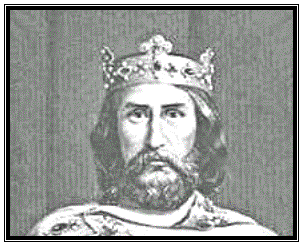Pelletier Genealogy
Family
Genealogy
|
Pelletier Genealogy |
Family Genealogy |
![]()

Charlemagne,
Emperor Of The Holy Roman Empire & King of the Franks
31st Great Grandfather
of Cyrias Pelletier
Charlemagne, Emperor Of The Holy Roman Empire, King of the Franks was king of the Franks from AD 768 to 814 and 'Emperor of the Romans' from 800 to 814. He became a key figure in the development of western Europe's medieval civilization. By his almost constant military campaigns, Charlemagne created a vast empire in the West which included much of the western part of the old Roman Empire as well as some new territory. He was the first Germanic ruler to assume the title of emperor, and the 'empire' he revived lasted in one form or another for a thousand years. Culturally and politically, he left his mark on the newly rising civilization of the West. Probably no ruler of the early Middle Ages better deserved the title of 'The Great.'
Charlemagne was the son of Pepin the Short, and the
grandson of Charles Martel. From 768 to 771, Charlemagne shared Pepin's kingdom
with his brother, Carloman. When Carloman died, Charlemagne became sole ruler.
He took up with energy the work begun by his father and grandfather. His first
step was to repress his hostile neighbors. Charlemagne gained wide acclaim for
his outstanding military ability, persistence, and success. He waged more than
50 campaigns against neighboring Germanic peoples on all sides, and against the
Avars, Slavs, Byzantines, and Moors.
Charlemagne's first great war was against the Lombards, a
Germanic people who had invaded Italy in the late 500's. They had been a source
of trouble to the popes ever since. In conquering them, Charlemagne followed
Pepin's policy of friendship and cooperation with the Roman Catholic Church.
This also served Charlemagne's own interests, because he became ruler of the
Lombard kingdom in Italy.
The long Saxon war was the most important of Charlemagne's
military ventures. The Saxons, who held the whole northwestern part of Germany,
were pagans. Their defeat after 30 years of war prepared the way for the
religious conversion and civilization of Germany.
By means of other wars, Charlemagne put down a rebellion in
Aquitaine, added Bavaria to his kingdom, and established several border states
to protect his outlying conquests. In eastern Europe, he defeated the Slavs and
Avars and made possible eastward migration by the Germans.
Charlemagne had built a vast and sprawling state that shared borders with such different peoples as the Slavs, Byzantines, and Moslems. He defended the Roman Catholic Church and constantly extended its power. He was far more powerful than the imperial successors of Constantine, the first Christian emperor in the West, and he ruled a much more extensive area. Because of his great
holdings, he decided to revive the Roman Empire, but as a
new empire that was European and Christian in Character. The relations of the
popes with the Byzantine, or Eastern Roman, emperors in Canstantinople had been
breaking down since the middle 700's. An alliance between the Roman Catholic
Church and the Franks, accomplished by proclaiming Charlemagne emperor, made
goodsense. Pope Leo III placed the imperial crown on Charlemagne's head on
Christmas Day, 800. The most important effect of this act was that it revived
the idea of empire in the West, an idea which caused both harm and good in
succeeding centuries.
Einhard, Charlemagne's secretary and friend, described the
emperor as large and strong of body, fond of active exercise, genial but
dignified, and sensible and moderate in his way of life. Charlemagne clearly
recognized his duties and responsibilities, and was a tireless worker. He could
not reverse the long trend toward decentralized government. But he could and did
control the power of the nobles and maintain a considerable degree of law and
order in a troubled age. His administrative methods helped raise the standard of
living.
Charlemagne's greatest contribution was his work as a patron of culture and extender of civilization. The Palace School, set up at his capital in Aachen under the leadership of the English scholar Alcuin (735-804), stimulated interest in education, philosophy, and literature. Most of the leading scholars were churchman, so this vast cultural activity greatly strengthened the church and had far-reaching and lasting results. In this way, Charlemagne, by means of his power and eminence, gave western Europe a unified culture so strong that it survived the terrible invasions and disorders of the next 200 years.